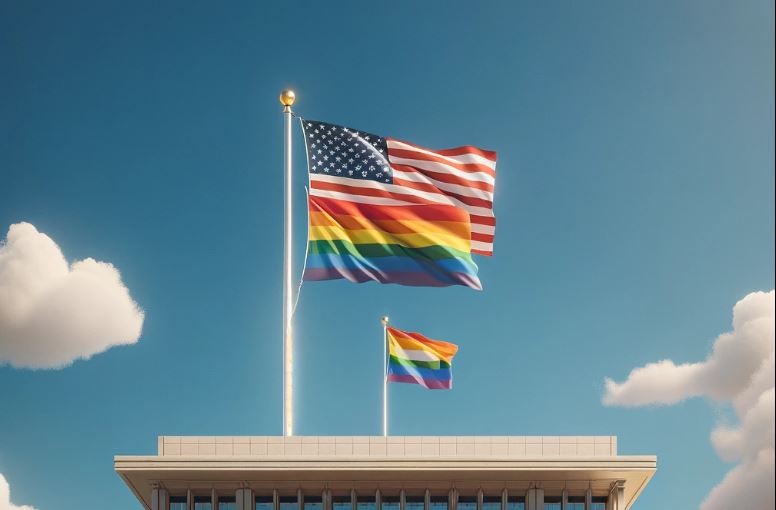Pride Flag Ban in Government Spending Bill
Republican Inclusion of Flag Restrictions Sparks Cultural Conflict
A controversial stipulation, inserted by House Republicans into the final budget bill, has reignited disputes in the political realm as a pivotal vote looms this Friday. The stipulation in question, part of the comprehensive $1 trillion “minibus” bill, aims to limit the display of flags at State Department facilities. This has been a contentious issue for socially conservative members of the GOP, especially since the practice of hoisting the gay pride rainbow flag at American embassies began during the tenure of the Obama administration.
For Democratic lawmakers from the LGBT community, this addition to the legislation strikes a particularly personal chord.
“House Republicans should be ashamed of themselves,” declared Rep. Mark Takano (D-CA), criticizing the move as a reflection of discriminatory beliefs forced upon American service members abroad, calling it “downright un-American.”
BUY YOUR PRIDE FLAG !
Specifications of the Flag Ban
The new fiscal agreement specifies that allocated funds may not be used to raise any flags other than the U.S. flag, the Foreign Service flag, the POW/MIA flag, among others including state, district, and tribal flags, at certain government buildings. This move extends previous Republican efforts to counteract the display of pride flags and other symbols representing cultural movements like Black Lives Matter.
House Speaker Mike Johnson (R-LA) has been vocal in touting this provision as a triumph for the Republican Party, seeking to consolidate support for the spending deal ahead of Friday’s House vote. Johnson’s announcement of the prohibition during a private meeting was met with applause from fellow Republicans.
Additionally, several Republican lawmakers have initiated proposals to ban the pride flag, highlighting the ongoing political discord over this issue. Notably, Rep. Diana Harshbarger (R-TN) and Sen. Roger Marshall (R-KS) introduced the One Flag For All Act following the pride flag’s display at the White House.
Political and Personal Reactions
The polarization extends beyond the halls of Congress. Rep. Becca Balint (D-VA) accused Republicans of relentlessly targeting the LGBT community, emphasizing the community’s desire for peaceful existence without such attacks.
The guidelines regarding flag displays have also varied by administration, reflecting deeper political divides. While the Trump administration prohibited pride flags on embassy poles during LGBT Pride Month in June 2019, the Biden administration reversed this policy upon taking office.
Rep. Cory Mills (R-FL) defended the necessity of the flag restriction, criticizing the promotion of divisive symbols under the guise of inclusion. He argues that such practices are detrimental to the ethos of military academies and recruitment.
Discover : LGBTQIA+ LGBT Flag Symbols.
Impending Legislative Deadline
This flag restriction is part of a larger conversation surrounding diversity, equity, and inclusion policies. Critics like Mills argue that these initiatives have adverse effects on military preparedness and cohesion.
The ban on flags not meeting specific criteria is temporary, set to expire with the end of the budget agreement on September 30. To prevent a partial government shutdown, Congress is under pressure to pass the spending legislation by the upcoming Saturday.

SHOW YOUR SUPPORT GET A PRIDE FLAG TODAY !















